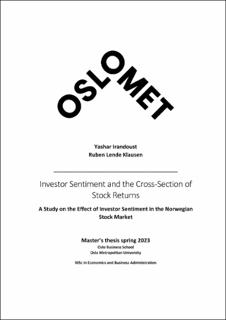| dc.description.abstract | We build a model of investor sentiment for the Norwegian stock market and examine its effect on the returns of various types of stocks following positive and negative sentiment periods. Our sample consists of all listed stocks on Oslo børs per year during the period 1994-2022. The model extends the classic framework of investor sentiment introduced in (Baker & Wurgler, 2006) and employed in subsequent literature. To better suit the Norwegian stock market, we replace some of their proxies with more relevant indicators, including a consumer confidence indicator and the Norwegian economic barometer index. We hypothesize that firms with highly subjective valuations and limited arbitrage opportunities are more likely to be affected by investor sentiment.
Our results show that stock returns in our sample are, on average, influenced by sentiment as expected. However, we identify certain deviations from the findings in (Baker & Wurgler, 2006). Specifically, we observe variations in the impact of sentiment on different portfolios based on firm characteristics. Through analyzing average returns of these portfolios, we make assumptions regarding the presence of sentiment effects in the Norwegian stock market. We find that sentiment influences the returns of portfolios formed on tangibility characteristics as well as those formed on external financing, as expected and in line with previous research. When running regressions examining the effect of sentiment on these portfolios, we experience significance problems with the other characteristics-based portfolios. This is in line with previous literature such as (Concetto & Ravazzolo, 2019; Corredor et al., 2015) who fail to verify the findings that stem from the U.S. stock market, when applied to markets in Europe.
Our research contributes to the literature by building a model of sentiment for Norway using relevant measures grounded in theory and previous literature. By examining the specific context of the Norwegian stock market, our study provides insights into the nuances of investor sentiment and addresses gaps in previous research. These findings enhance the understanding of investor behavior and offer valuable implications for investors and policymakers in the Norwegian financial landscape. | en_US |
